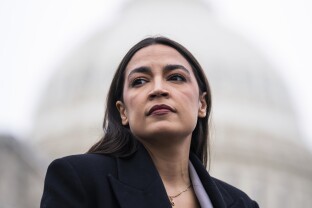Democrats have rallied around “affordability” after the party’s resounding wins in Virginia and New Jersey earlier this month.
But questions remain on whether Democrats can actually unite around an economic strategy ahead of 2026, especially after they openly split on the government shutdown, with little to show for it.
Since President Donald Trump’s first term in office, Democrats have disagreed over how to campaign against him — whether to go after scandals and alleged corruption within his administrations or focus on more tangible things to voters, like the economy.
“It’s important to do both, but the biggest part is having very clear policy goals” to message on, Rep. Alexandria Ocasio-Cortez said.
Ocasio-Cortez emphasized that Democrats can campaign on kitchen-table affordability issues while telling a story of “the Trump administration’s corruption and how that corruption leads to these kinds of outcomes.”
The early November elections didn’t provide a clear answer for Democrats on what policies, exactly, to run on. Democrats saw victories from both New York City democratic socialist Zohran Mamdani and the more centrist campaigns of Mikie Sherrill in New Jersey and Abigail Spanberger in Virginia.
Sen. Chris Murphy, a potential 2028 candidate for president, said Democrats are considered “illegitimate” in much of the country because “this party has been addicted to incremental change solutions that aren’t as big as the problems that people face.”
“Recognize that there’s a reason why Bernie Sanders is the only person that draws 70,000 people, because his ideas are big enough to meet the moment,” Murphy said last week at a town hall in New Hampshire. “So whether you support Mamdani or not, he told you the path, which is to answer every question by talking about costs.”
Rep. Seth Moulton, who has mounted a primary challenge against Sen. Ed Markey, told NOTUS that Democrats will have “a lot of debate about how exactly we tackle” affordability, an issue that is “front of mind” for voters in Massachusetts — one of the bluest, wealthiest, and most expensive states in the country.
“This is something I’ve been advocating for since right after the last election. Too often we’re preaching down to people and telling them what they want, and we need to actually listen,” Moulton said. “They can’t afford a home, they can’t afford health care.”
Democrats’ challenge going into 2026 will be to balance messaging against the president’s agenda with tangible policy proposals to lower the cost of living, said Jared Bernstein, a senior fellow at the Center for American Progress.
Bernstein said Democrats are already largely where they need to be regarding communicating on the economy. Although the party was divided over how to end the shutdown, it stood together on trying to make health care more affordable.
“Democrats do not naturally unite,” Bernstein said. “When it comes to affordability, we’re seeing them doing just that. Democrats have really done a solid job when it comes to uniting around affordability.”
Trump, meanwhile, has tried to deflect blame for rising costs. He has already taken action to try to ease some of the strain on Americans’ pocketbooks — that Democrats say he caused.
He signed an executive order Friday lifting reciprocal tariffs on coffee, tropical fruits, beef and other agricultural products commonly found in Americans’ grocery baskets. Prices for these items surged and have stayed high since the president levied the tariffs in April.
He also floated a 50-year mortgage proposal on Truth Social days after the elections, which angered White House officials and was downplayed by a Treasury Department official. The policy would increase Americans’ total interest payments over the length of their mortgages.
Trump has been more dogged about his $2,000 rebate proposal for moderate-income Americans, which he said he would disburse around mid-2026 from tariff revenue. It’s another proposal to send money straight to consumers, in lieu of federal subsidies for Affordable Care Act premiums.
White House spokesperson Kush Desai said inflation has “cooled” to 2.5% under President Trump, as prices for drugs, gas, eggs and other food items have dropped.
During a speech Monday at the McDonald’s Impact Summit, Trump blamed Joe Biden’s administration for starting the affordability crisis.
“Affordable it should be our word, not theirs, because the Democrats got up and took affordability, affordability, and they don’t say that they had the worst inflation in history, the highest energy prices in history. Everything was the worst,” Trump said.
Murphy, meanwhile, said Democrats need to be bolder in their messaging and Trump has given them the opening they need.
“Trump has exposed himself as a fake populist. He said he was going to break up concentrated power, that he was going to deliver salvation to poor people in this country, and he’s done nothing,” he said.
Sign in
Log into your free account with your email. Don’t have one?
Check your email for a one-time code.
We sent a 4-digit code to . Enter the pin to confirm your account.
New code will be available in 1:00
Let’s try this again.
We encountered an error with the passcode sent to . Please reenter your email.


